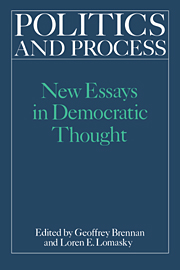Book contents
- Frontmatter
- Contents
- Acknowledgments
- List of contributors
- Introduction
- Chapter 1 The justification of democracy
- Chapter 2 Large numbers, small costs: the uneasy foundations of democratic rule
- Chapter 3 Evaluating the institutions of liberal democracy
- Chapter 4 Democracy: the public choice approach
- Chapter 5 The democratic order and public choice
- Chapter 6 Radical federalism: responsiveness, conflict, and efficiency
- Chapter 7 Contractarian presuppositions and democratic governance
- Chapter 8 In quest of the social contract
- Chapter 9 Rationality and the justification of democracy
- Chapter 10 The morality of democracy and the rule of law
- Index
Chapter 9 - Rationality and the justification of democracy
Published online by Cambridge University Press: 29 September 2009
- Frontmatter
- Contents
- Acknowledgments
- List of contributors
- Introduction
- Chapter 1 The justification of democracy
- Chapter 2 Large numbers, small costs: the uneasy foundations of democratic rule
- Chapter 3 Evaluating the institutions of liberal democracy
- Chapter 4 Democracy: the public choice approach
- Chapter 5 The democratic order and public choice
- Chapter 6 Radical federalism: responsiveness, conflict, and efficiency
- Chapter 7 Contractarian presuppositions and democratic governance
- Chapter 8 In quest of the social contract
- Chapter 9 Rationality and the justification of democracy
- Chapter 10 The morality of democracy and the rule of law
- Index
Summary
This is an essay about the justification of democracy in which democracy is understood as a way of making coercively enforceable collective decisions. The problem of justifying democracy arises once a group perceives a need for collective action, that is, a need to construct principles specifying the terms of cooperation. One's theory of democracy, then, is likely to depend on one's views about the reasons for collective action. Let us distinguish two such views. In one, collective action is thought necessary to resolve coordination, externality, and Prisoner's Dilemma problems. We might loosely refer to this view as the “market failure theory of collective action.” In this account, cooperation is necessary only because markets are imperfectly competitive. Market failure creates a need for individuals to abandon rational self-interested strategies over specifiable domains in favor of compliance with jointly maximizing ones. Over some domains individuals must abandon competition in favor of cooperation; and the question they must ask is, By what rules or principles are the terms of cooperation to be determined?
In the other view of collective action, individuals are already disposed to cooperate with one another on fair terms. Individuals may already share particular conceptions of just cooperation and seek to institutionalize them concretely in political and legal institutions.
- Type
- Chapter
- Information
- Politics and ProcessNew Essays in Democratic Thought, pp. 194 - 220Publisher: Cambridge University PressPrint publication year: 1989
- 6
- Cited by

